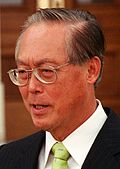وزیراعظم سنگاپور
وزیر اعظم جمہوریہ سنگاپور کی حکومت کا سربراہ ہوتا ہے۔ ملک کا صدر، و وزیر اعظم جو ایک رکن پارلیمنٹ (ایم پی) ہوتا ہے کو اس عہدے کے لیے مقرر کرتا ہے جو زیادہ ارکان کے ووٹوں اور پارلیمنٹ کے اعتماد کو حاصل کرنے کا امکان رکھتا ہے۔ موجودہ وزیر اعظم لی ہیسین لونگ ہیں، جنھوں نے 12 اگست 2004 ءکو عہدہ سنبھالا۔
| Prime Minister the Republic of Singapore | |
|---|---|
 Coat of arms of Singapore | |
| خطاب |
|
| قسم | سربراہ حکومت |
| مخفف | PM |
| رہائش | سری ٹیماسیک (سنگا پور) |
| تقرر کُننِدہ | صدر سنگاپور |
| مدت عہدہ | 5 years, renewable |
| تاسیس کنندہ | لی کوان یئو |
| تشکیل | 3 جون 1959 |
| نائب | Heng Swee Keat (2019 — present) Lawrence Wong (2022 — present) |
| تنخواہ | S$2,200,000 annually (including S$192,500 MP salary) |
| ویب سائٹ | www |
سنگاپور کو ویسٹ منسٹر سسٹم کے مطابق بنایا گیا ہے۔ وزیر اعظم صرف پارلیمنٹ میں اکثریت کے اعتماد کے ساتھ حکومت کرتا ہے۔ اس طرح، وزیر اعظم عام طور پر رکن پارلیمنٹ (ایم پی) ہوتا ہے اور سب سے بڑی پارٹی یا جماعتوں کے ساتھ اتحاد کی قیادت کرتا ہے۔ عموماً وزیر اعظم اس سیاسی جماعت کا رہنما ہوتا ہے جس کی پارلیمنٹ میں اکثریت ہوتی ہے۔
وزرائے اعظم کی فہرست
| No. | Portrait | Name (birth and death) Constituency | Election | Term of office | Political party | ||
|---|---|---|---|---|---|---|---|
| Took office | Left office | Time in office | |||||
| 1 |  | Lee Kuan Yew (1923–2015) MP for Tanjong Pagar SMC (1955–1991) MP for Tanjong Pagar GRC (1991–2015) | 1959 1963 1968 1972 1976 1980 1984 1988 | 5 June 1959 | 28 November 1990 | 31 سال، 178 دن | People's Action Party |
| The first and longest-serving prime minister of Singapore. His tenure led to the expansion of Singapore's economy from a third world country into a first world country. He introduced the National Service (NS) scheme, with the help of his defence minister Goh Keng Swee, and introduced the "Stop-At-Two" children policy in 1960s, fearing over-expansion of Singapore's population. In the 1980s, he introduced the Graduate Mother Scheme to counter the effects of the previous policy, which received backlash. The policy was withdrawn shortly thereafter. He led the PAP into 8 consecutive election victories. During his tenure, Singapore grew to become the most prosperous nation in South-East Asia.[1] | |||||||
| 2 |  | Goh Chok Tong (b. 1941) MP for Marine Parade SMC (1976–1988) MP for Marine Parade GRC (1988–2020) | 1991 1997 2001 | 28 November 1990 | 12 August 2004 | 13 سال، 258 دن | People's Action Party |
| The second prime minister of Singapore. He introduced several major policies and policy institutions, such as Medisave, Non-constituency Member of Parliament (NCMP), Government Parliamentary Committee (GPC), Group Representation Constituency (GRC), Nominated Member of Parliament (NMP), the Vehicle Quota Scheme, the Elected President scheme and Singapore 21. During his tenure Singapore experienced several crises, such as the 1997 Asian financial crisis, threats of terrorism, including the 2001 Singapore embassies attack plot by Jemaah Islamiyah, the 2001–2003 economic recession, and the 2003 SARS outbreak. He also introduced the Baby Bonus scheme in a bid to increase birth rates. Prior his appointment as prime minister, he served as Senior Minister of State for Finance, Minister for Trade and Industry, Minister for Health, Minister for Defence and First Deputy Prime Minister.[2] | |||||||
| 3 |  | Lee Hsien Loong (b. 1952) MP for Teck Ghee SMC (1984–1991) MP for Ang Mo Kio GRC (1991–present) | 2006 2011 2015 2020 | 12 August 2004 | Incumbent | 19 سال، 256 دن | People's Action Party |
| The third prime minister of Singapore and the eldest son of Lee Kuan Yew, the first prime minister. He introduced the five-day working week for civil servants, with the hope of increasing the birth rate. One of his major accomplishments was to propose the building of two Integrated Resorts (IRs) in Singapore. Singapore hosted the inaugural summer یوتھ اولمپک گیمز in 2010. He promoted the abolition of school ranking. In 2013, he presided over the worst haze crisis in Singapore's history. He has also dealt with the 2013 Dengue epidemic and the COVID-19 pandemic since 2020. Prior to his appointment as prime minister, he served as Deputy Prime Minister, Minister for Finance, and Minister for Trade and Industry. | |||||||
حوالہ جات
🔥 Top keywords: صفحۂ اولخاص:تلاشانا لله و انا الیه راجعونمحمد بن عبد اللہحق نواز جھنگویسید احمد خانپاکستاناردوغزوہ بدرمحمد اقبالجنت البقیععلی ابن ابی طالبقرآنعمر بن خطابانہدام قبرستان بقیعحریم شاہغزوہ احداردو حروف تہجیاردو زبان کی ابتدا کے متعلق نظریاتابوبکر صدیقاسلاممحمد بن اسماعیل بخاریکوسغزوہ خندقخاص:حالیہ تبدیلیاںاسماء اللہ الحسنیٰجناح کے چودہ نکاتفلسطینموسی ابن عمراندجالمیری انطونیامتضاد الفاظمرزا غالبآدم (اسلام)پریم چندفاطمہ زہراصحیح بخاریجنگ آزادی ہند 1857ءضمنی انتخابات
